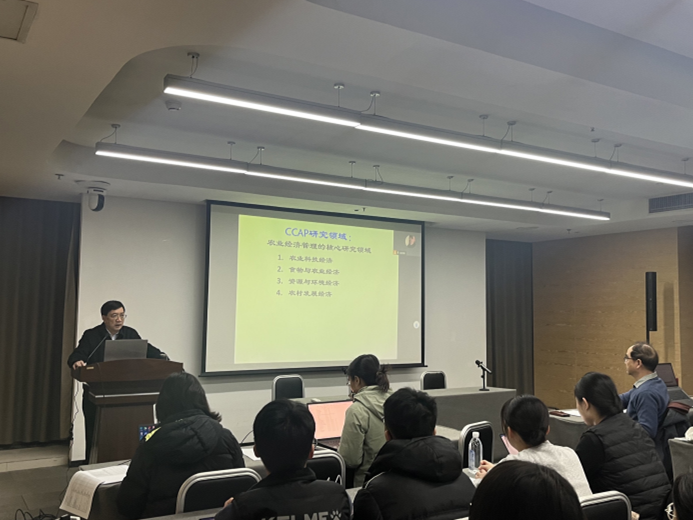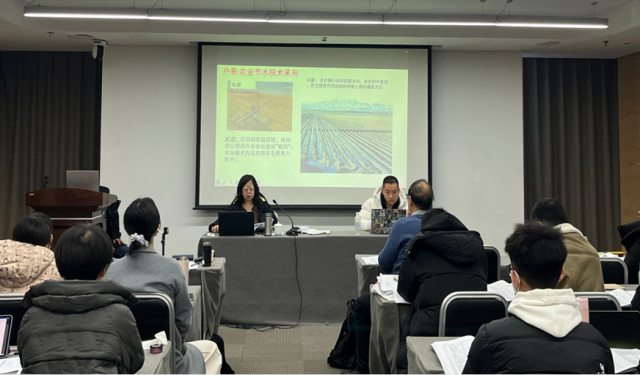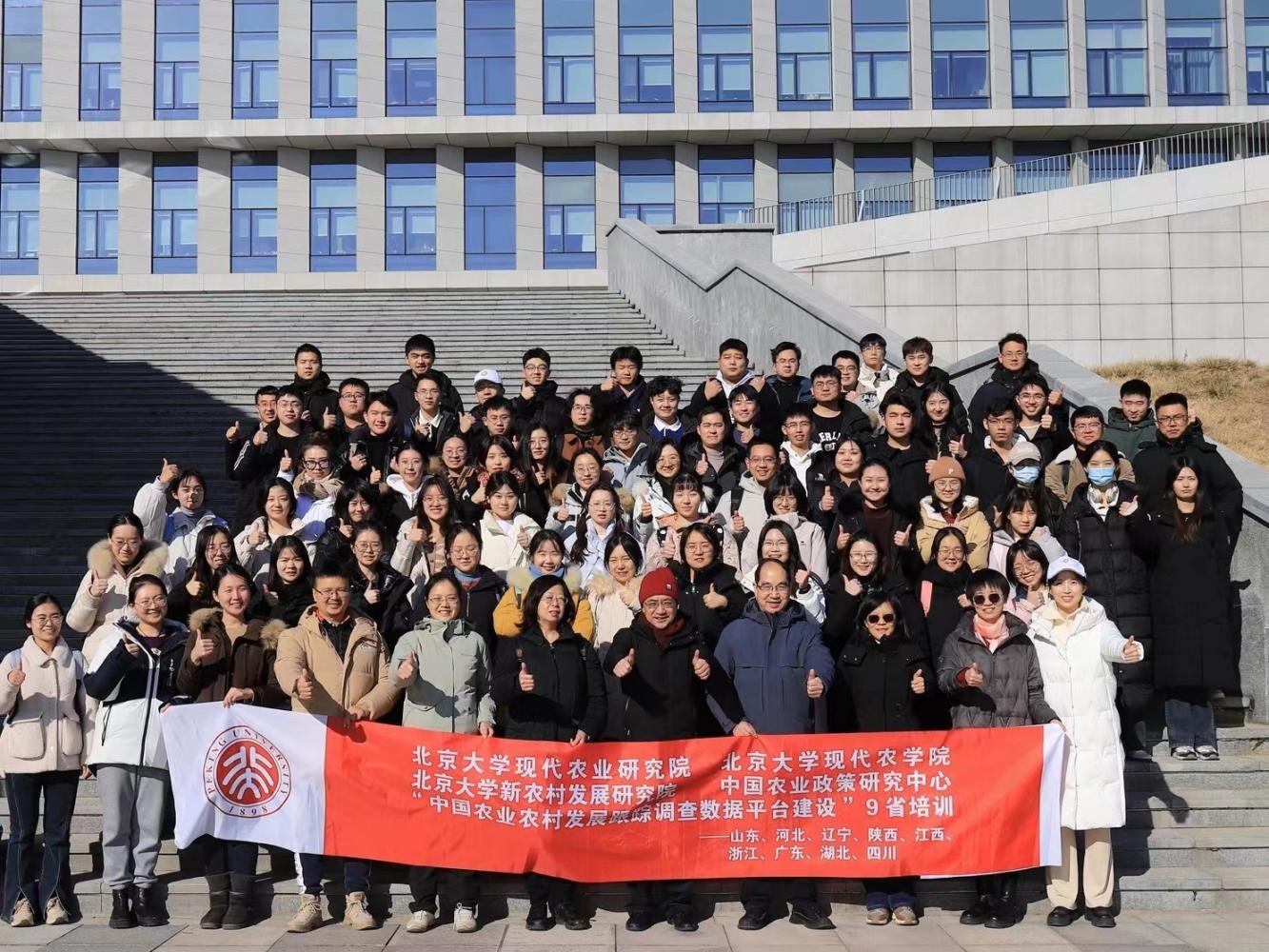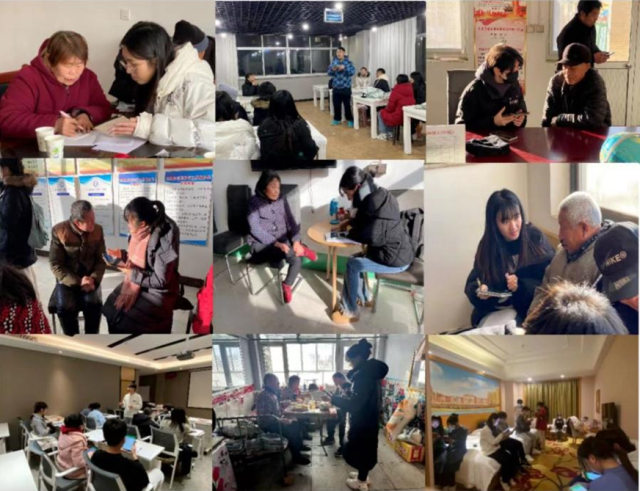current location: Home> Central News
Central News
"China Rural Revitalization Strategy Data Platform" Conducts Research in Nine Provinces of China
Release date:2024/02/20 Source: CCAP
The 19th CPC National Congress put forward the implementation of rural revitalization strategy, is the CPC Central Committee vigorously promote the new era of "three rural" work, to achieve the countryside, "industrial prosperity, ecological livability, civilized countryside, effective governance, and living a rich life," a major decision-making deployment. Research is the foundation of planning and the way to accomplish things. In order to deeply understand the current situation of China's agricultural and rural development, and to provide decision-making reference for comprehensively promoting rural revitalization, the Institute of Modern Agriculture of Peking University, School of Modern Agriculture of Peking University, New Rural Development Institute, and China Center for Agricultural Policy jointly carried out the project of "Construction of China Rural Revitalization Strategy Think Tank Data Platform" from January 13 to 25, 2024, closely focusing on the rural revitalization strategy of the countryside. "The project closely focuses on the key issues of rural revitalization and agricultural and rural development, and the ninth round of data research was conducted in nine provinces, namely Shandong, Guangdong, Zhejiang, Hubei, Sichuan, Shaanxi, Hebei, Liaoning and Jiangxi. Previously, eight rounds of database research have been conducted since 2000, always with the principle of "providing real and reliable data support for research on agricultural and rural development and farmers' income increase", and with the goal of "providing policy guidelines and decision-making references for rural revitalization". With the principle of "providing real and reliable data support for research on agricultural and rural development and farmers' income increase" and the goal of "providing policy guidelines and decision-making references for rural revitalization", the program is of great significance in the construction of academic disciplines, cultivation of talents, and solving the major problems of agricultural and rural research.
Professor Huang Jikun, Director of New Rural Development Institute and Director of the Rural Revitalization Strategy Research Center of Peking University's Institute of Modern Agriculture, is the initiator of the "China Rural Revitalization Strategy Think Tank Platform", and is also the general leader of this research. More than 70 professors, researchers, post-doctoral fellows, doctoral students and research assistants from Peking University Modern Agricultural Research Institute, Peking University Modern College of Agriculture, New Rural Development Institute, and China Center for Agricultural Policy participated in the lead team and coordination of the work in each province. In addition, a total of more than 350 students from more than 20 colleges and universities in China, such as China Agricultural University, Northwest Agricultural and Forestry University, Shandong Agricultural University, Northwest Agricultural and Forestry University, Sichuan Agricultural University, South China Agricultural University, Jinan University, Jiangxi Agricultural University, and the University of Hong Kong, participated in the research. The research was also supported by the Jiangxi Rural Revitalization Strategy Research Institute, Shenyang Agricultural University, Sichuan Agricultural University, Shaanxi Normal University and other sister units.
From January 13 to 15, at the beginning of the research, all members of the Shandong research and the core members and backbones of the other eight provinces gathered in Weifang Xiaoshan to carry out the questionnaire training and field test. Prof. Huang Jikun personally, focusing on the content of the project, vividly shared the rural field household experience and skills, to realize the "theory + practice" all-round training, the researchers have said that they have benefited a lot.




From January 16th to 25th, the research work officially started. The project team carried out household data collection in Lu, Guangdong, Zhejiang, Hubei, Sichuan, Shaanxi, Hebei, Liao, and Gan provinces, with a total of 57 counties and municipalities, 288 villages, and more than 3,080 households, of which 10 counties and cities and 60 villages in Shandong, 5 counties and cities and 20 villages in Zhejiang, Guangdong, Hubei, Sichuan, and Shaanxi, 10 villages in 5 counties and counties in Hebei and Liaoning, and 128 villages in 12 counties and counties in Jiangxi Province. During the research, the interviewed farmers and villages expressed that they welcomed the project team very much, and were very impressed by the project's tracking surveys all year round, and cooperated with the research work very actively. Teachers in charge and students in charge of the team performed their respective duties and cooperated with each other, and the researchers worked together and were responsible, finally successfully completing the research tasks in the nine provinces. The researchers expressed that they had a lot of feelings and harvests, not only had a deeper understanding of China's agricultural production, rural environment and farmers' life, but also had a deeper understanding of the new era of agricultural and rural work and the implementation of the strategy of revitalization of the countryside, and also laid a solid foundation for the subsequent development of related academic research.

The research triggered the team to think deeply about the "Three Rural Issues". The following is a summary of the feelings and experiences of some of the researchers.
Researchers' perceptions and experiences
The ten-day research ended in the light snow in Lichuan, and it was not only the questions in the questionnaire that changed us from strangers to familiarizers, but also the distance between each of us. The friendly faces of more than ten farmers always lingered in my mind. As time passes, I may slowly forget how many people they have in their families, what they grow, and how many acres of land they have contracted, but together they helped me to give concrete meaning to the term "three farmers".
We gathered from Jianli all the way to the west, we saw along the way to rice shrimp co-cropping to rice farmers to bring new paths to wealth and income, high-standard farmland renovation in full swing, the beautiful countryside, "the new scroll" initially painted, leisure agriculture and lodging economy for the countryside to add new vitality. Listening to the familiar accent, feeling the new changes in the development of agriculture and rural areas in my hometown, talking with farmers let me see their most real production situation, hear the most real ideas in their hearts, walking in the village with the eyes to feel the great changes in the rural habitat environment, such a real countryside is in the books and literature I can not perceive.
In the research we not only for the choice of research direction and determine the theme of the research to provide practical support, its value lies in the baptism of our soul, so that we can actually feel the "three rural" work of the true feelings, to explore the significance of our agricultural economics specialization. Recalling the hot stove in the farmer's house, I felt the warmth and happiness of the rural life; when I recalled the grandmother handing over the sweet oranges, I understood what is meant by the simplicity of the farmers; when my grandfather insisted on stuffing the peanuts planted at home into my pocket, I felt what is the kindness of the farmers; when they pushed me to hand over the subsidies for lost wages time and time again, I understood what they are! generous.
We have such a group of simple and lovely people who work at sunrise and rest at sunset. They may not have a high income, but they use their sweat to help 1.4 billion of us keep our rice bowls in our own hands. I know that the end of each research is the beginning of another period of study, and we should bring more meaningful and valuable research close to reality to the work of the three rural areas, and strive to benefit this group of lovely people.
Zhao Wanyu, Hunan Agricultural University
When I stepped into the villages, the rural labor force and crop yield data that were originally in the statistical yearbook suddenly became vivid. I began to see the real situation in the countryside, which is no longer abstract concepts and figures, but materialized into the attention and construction of the governments at township, township and village levels on agricultural production and village collective economy, as well as the inputs and outputs of farmers in farming, sowing and harvesting. During the ten days of research, I gradually adapted to the dialect of the village cadres, who told me in their own way about the development and change process of the villages, which made me realize the diversity of different villages in terms of demographics, cultivation methods and governance modes, as well as their efforts and real feelings for the construction of the villages.
Wang Aizhao, PhD Candidate, Peking University
If I talk about this time, I think I would describe it as insightful, heartfelt, enriching and wonderful. I was most impressed by Ms. Yi's humble and kind words as she told the story of her research. In the classroom of Sichuan Agriculture, I suddenly realized that there was really a group of people who always cared about the lives of the people in remote rural areas, and at that moment, Mr. Shuren's sentence "Infinite faraway places and countless people are all related to me" suddenly began to materialize. In the actual research, I kept reconstructing, revising and summarizing my own research methodology, and I saw my growth and progress until the last interviewee, I realized the significance of this questionnaire, and what I got from the continuous interviews for many years was not only the data, but also the changes in the lives of the common people from the interviewees. Dreams start from learning, careers start from practicing, and what I am practicing now has made my ambition clear. I would like to closely link my personal ideals with the happiness of the people, and to cultivate them deeply and enjoy myself in them.
Li Ziqi, Sichuan Normal University
In the cold winter months, we set off at eight o'clock in the morning every day and went to one village after another. There was no centralized heating in the villages, so the lucky team members were able to interview farmers with air-conditioning and hot kangs, while many others completed questionnaires after questionnaires while shivering. In the days of a few degrees below zero or a dozen degrees below zero, the cold rain outside the house was sharp, and inside the house was also freezing and numbing people's hands and feet.
But the farmers' hearts were warm. One day, we went to a mountain village, village cadres took us from house to house to knock on the door of the people we visited. When we arrived at a grandmother's house, before I finished my greeting, she obediently put the hat on my shirt over my head and instructed us to wear more in the cold weather. On another day, the snow on the ground was still thick, and the afternoon sun was not very warm. The village cadre used the village loudspeaker to help us notify the interviewees, repeating over and over again, "The students from Peking University are coming to do a research, this is a good thing, this is a good thing, if you hear the name come over, come over right away." Within a few minutes, the interviewees arrived at the village committee one after another, bringing the team members home one by one.
The enthusiasm of the team members was also not dampened by the intense work and bad weather. Although we had to leave early every morning, no one was ever late. In the first few days, we were always busy until nightfall before we could leave from the village. Nonetheless, everyone was able to insist on checking whether there were any problems with the questionnaires of the day, communicating what they had encountered, and sharing their feelings when they returned to their lodgings in the evening.
In just over ten days of research, and after moving through more than ten villages, we have seen many challenges in China's agricultural and rural development: how to improve the efficiency of agricultural production, how to popularize new technologies, and how to improve the basic public services in the countryside, etc. I think this research has brought us a great deal of experience. I think this research brings us not only a piece of data, but also a little bit of insight into the development of agriculture and rural areas. In the future study and work, I wish to be bare hearted and down-to-earth, and always make the research "a good thing", and never let down the interviewees and the care and trust of many people who support us.
Dr. Li Wanjun, Peking University
During this research, the research team explored the depths of knowledge, looked at the distant mountains and traveled forward. During the research process, we have not flinched in the cold weather, we have the excitement and enthusiasm of discussing and polishing the questionnaire late at night, the firmness of measuring the land with our feet, the professionalism and standard of recording the data seriously and objectively, and the sincerity of facing every farmer with a pure heart. "The students really wrote their knowledge on the motherland and had no regrets about this trip.
Chen Tiange, China University of Geosciences (Wuhan)
As a member of the household research team of the "China Rural Revitalization Strategy Think Tank Data Platform Construction Project", I had the honor to go into the cities of Jianli, Zhijiang, and Lichuan in Hubei Province, and personally experienced this educational field trip. The research was not just a collection of data, but also a journey of deep learning and personal growth in rural reality. Our team was diversified and professional, including the team leader, deputy team leader, front-end staff, and 10 enthusiastic team members. The efficient coordination of the team leader and vice team leader ensured the smooth progress of the research work, while the front-end staff played the role of a bridge between each village and farmer's family to ensure that our research work could be carried out smoothly. The close cooperation between the team members and their full commitment ensured the professionalism and efficiency of the whole research process.
In this research, we started from the rusty use of questionnaires to gradually master the core points, which not only improved our research skills, but also deepened our understanding of the current situation in rural areas. In the process of communicating with farmers, the biggest challenge was how to build mutual trust. By listening patiently and respecting each farmer's point of view, we gradually won their trust, thus obtaining more authentic and in-depth information. In addition, the challenges of the natural environment were a reality we had to face. The rainy and snowy weather and rugged mountain roads brought us considerable difficulties, but also deepened our understanding of the current situation of infrastructure in rural areas, and practiced our adaptability and teamwork spirit.
After conducting in-depth interviews with households, I deeply appreciated the complexity and challenge of rural revitalization, and at the same time witnessed its great potential and bright prospects. I firmly believe that with more similar research projects, we will lay a solid foundation for the realization of agricultural modernization, comprehensive rural revitalization and comprehensive development of farmers.
Luo Hanxiang, Huazhong Agricultural University
After a few days of research, I realized that even within the economically developed Guangdong Province, the economic development varies greatly, which made me think further about rural land, population, cultivation and other issues. A generation has a generation of perseverance. During this research, I found that most of the village secretaries are middle-aged forces born in the 1970s, who are rooted in their hometowns and witnessing the development of their hometowns; while many of the visitors are youthful forces who have just stepped into the university for two or three years, who are full of enthusiasm and hope to contribute to the revitalization of the countryside. The perseverance of the middle-aged generation and the enthusiasm of the younger generation together constitute a powerful driving force for the development of China's countryside. With their joint efforts, I believe China's rural areas will see better development.
Wei Jingran, PhD Candidate, Peking University
The ten-day research was successfully completed in the early snow in the south. In Ruijin City, Jiangxi Province, we went deep into the villages in the mountains and entered the homes of farmers to listen to their voices and feel their lives. This research made me deeply understand the meaning of "agriculture is the foundation of the world".
During the research, I not only learned about the farmers' hard-working life, but also saw the beauty and tranquility of the countryside, and clarified the importance of environmental protection. They water their hopes with sweat and create life with their hands. I deeply admired their tenacity and hard work, which also made me understand the principle of "a penny for a penny, a penny for a penny". They love nature and cherish resources, and their actions made me deeply feel the profound meaning of "green water and green mountains are gold and silver mountains". This research allowed me to see the real rural life that I could not perceive in books and literature, and it also made me feel the importance of doing research that is closer to reality.
It is this group of simple and lovely people who guarantee the "food security" of the country. I am also more convinced that only by using research to identify and solve real rural problems, firmly promoting "rural revitalization", and caring for all aspects of rural farmers and agriculture, can we better benefit the people and develop the countryside into a more prosperous, livable and sustainable home.
Cao Yuxin, Research Assistant, Peking University


No less than the slightest awn, making a torch into a sun, where the heart is, where the action is. Visiting a thousand households in a hundred villages, the members of the group have gained a deep and systematic understanding of the basic status of China's agricultural production, farmers' income and rural development, and have deeply appreciated the complexity and challenge of rural revitalization. A questionnaire with hundreds of questions focuses on hundreds of millions of farmers in China. Each farmer is a microcosm of the agricultural production of farmers in a region, and it is of great practical significance for the implementation of China's "rural revitalization" strategy to dig out and refine the real problems of the "three rural areas" from the microcosms of millions of farmers and to provide a solution path.



 Home
Home



